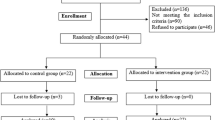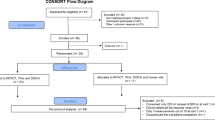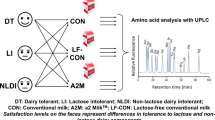Abstract
Objective: To investigate in adult male volunteers the effect of a new fermented milk product, fermented by Lactobacillus acidophilus and with fructo-oligosaccharides added, on blood lipids.
Design: Randomized placebo-controlled double-blind two-way cross over trial with two treatment periods of three weeks, separated by a wash-out period of one week.
Setting: the study was performed at the TNO Nutrition and Food Research Institute in Zeist, The Netherlands.
Subects: Thirty normal healthy men, aged 33–64 y (mean serum total cholesterol level: 5.23±1.03 (s.d.)), were selected for this study. Normal health was assessed by pre study screening. All subjects were used to an average Dutch food pattern.
Interventions: During the treatment periods subjects consumed three times daily a 125 ml of either test or reference product as a part of their habitual diet. The test product was a milk, fermented by yogurt starters and Lactobacillus acidophilus, and contained 2.5% fructo-oligosaccharides, 0.5% vegetable oil and 0.5% milk fat. The reference product was a traditional yogurt (milk fermented only by yogurt strains), containing 1% milk fat. Blood samples for serum lipid analysis and blood glucose measurements were taken before the start of the experiment and at the end of both treatment periods.
Results: As compared to the reference product, consumption of the test product resulted in significantly lower values for serum total cholesterol (P<0.001), LDL-cholesterol (P<0.005), and the LDL/HDL-ratio (P<0.05) by 4.4, 5.4 and 5.3% respectively. Levels of serum HDL-cholesterol, triglycerides and blood glucose remained essentially unchanged. The beneficial effects of the test product on serum cholesterol were largely related to an increase of this parameter during the consumption of the reference product.
Conclusions: As compared to traditional yogurt, daily consumption of three times 125 ml of test product specifically lowered serum LDL-cholesterol levels in normal healthy male adult subjects with borderline elevated levels of serum total cholesterol within three weeks.
Sponsorship: The study was sponsored by Danone, France.
This is a preview of subscription content, access via your institution
Access options
Subscribe to this journal
Receive 12 print issues and online access
We are sorry, but there is no personal subscription option available for your country.
Buy this article
- Purchase on SpringerLink
- Instant access to full article PDF
Prices may be subject to local taxes which are calculated during checkout
Similar content being viewed by others
Author information
Authors and Affiliations
Rights and permissions
About this article
Cite this article
Schaafsma, G., Meuling, W., van Dokkum, W. et al. Effects of a milk product, fermented by Lactobacillus acidophilus and with fructo-oligosaccharides added, on blood lipids in male volunteers. Eur J Clin Nutr 52, 436–440 (1998). https://doi.org/10.1038/sj.ejcn.1600583
Received:
Revised:
Accepted:
Published:
Issue Date:
DOI: https://doi.org/10.1038/sj.ejcn.1600583
Keywords
This article is cited by
-
Characterization and evaluation of the cholesterol-lowering ability of Lactiplantibacillus plantarum HJ-S2 isolated from the intestine of Mesoplodon densirostris
World Journal of Microbiology and Biotechnology (2023)
-
The Effects of Synbiotic Supplementation on Metabolic Status in Women With Polycystic Ovary Syndrome: a Randomized Double-Blind Clinical Trial
Probiotics and Antimicrobial Proteins (2019)
-
Modulations in the offspring gut microbiome are refractory to postnatal synbiotic supplementation among juvenile primates
BMC Microbiology (2018)
-
Gut microbiota as a potential _target of metabolic syndrome: the role of probiotics and prebiotics
Cell & Bioscience (2017)
-
The effects of probiotic bacteria on glycaemic control in overweight men and women: a randomised controlled trial
European Journal of Clinical Nutrition (2014)



